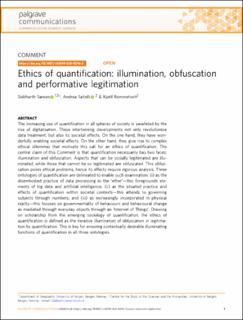Ethics of quantification: illumination, obfuscation and performative legitimation
Journal article, Peer reviewed
Published version

Åpne
Permanent lenke
https://hdl.handle.net/11250/2731861Utgivelsesdato
2020Metadata
Vis full innførselSamlinger
- Department of Geography [634]
- Registrations from Cristin [9791]
Sammendrag
The increasing use of quantification in all spheres of society is paralleled by the rise of digitalisation. These intertwining developments not only revolutionise data treatment, but also its societal effects. On the one hand, they have wonderfully enabling societal effects. On the other hand, they give rise to complex ethical dilemmas that motivate this call for an ethics of quantification. The central claim of this Comment is that quantification necessarily has two faces: illumination and obfuscation. Aspects that can be socially legitimated are illuminated, while those that cannot be so legitimated are obfuscated. This obfuscation poses ethical problems, hence its effects require rigorous analysis. Three ontologies of quantification are delineated to enable such examination: (i) as the disembodied practice of data processing in the ‘ether’—this foregrounds elements of big data and artificial intelligence; (ii) as the situated practice and effects of quantification within societal contexts—this attends to governing subjects through numbers; and (iii) as increasingly incorporated in physical reality—this focuses on governmentality of behaviours and behavioural change as mediated through everyday objects through an ‘Internet of Things’. Drawing on scholarship from the emerging sociology of quantification, the ethics of quantification is defined as the iterative illumination of obfuscation in legitimation by quantification. This is key for ensuring contextually desirable illuminating functions of quantification in all three ontologies.
